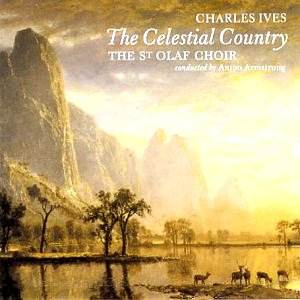The major work on this disc, "The
Celestial Country," is one of Ivesí
earliest multi-movement compositions.
It dates from approximately the same
period as his First Symphony and First
String Quartet. However, unlike the
First Symphony and First String Quartet,
this sacred cantata received its first
performance while Ives was still a young
man, not long after he had composed
it. The work was premiered on April
19, 1902 at the Central Presbyterian
Church in New York City, where Ives
served as church organist. Ironically,
not long after premiering the work,
Ives resigned his post as organist and
began his long period of artistic isolation
and maturation. I think that the experience
convinced Ives that he couldn't compose
music that would satisfy social expectations
and also satisfy his own artistic impulses.
Later, he would scrawl the words "Damned
rot and worse!" across a favourably
written newspaper review of the performance.
Unlike the works of Ivesí maturity,
"The Celestial Country" is
a fairly conventional composition that
was heavily indebted to other composers
of the period, including Ivesí music
professor at Yale, Horatio Parker. In
fact, Ives mistakenly believed that
he was setting the same verse that Parker
used in his cantata "Hora novissima."
In reality, the words from "The
Celestial Country" are derived
from English churchman Henry Alfordís
hymn "Forward! Be Our Watchword."
As Ivesí biographer Jan Swafford notes,
"The treacly religiosity of Alfordís
title is an indication of the [musical
compositionís] style. He exhorts the
Pilgrim to Climb the Path Ever Forward
and Faint Not in His Journey Toward
the Light, Ďthither, onward, thither
/ In the spiritís might,í and so on"
(CEI: A Life With Music, p. 159).
Despite the workís shortcomings, it
is worth exploring for a more complete
understanding of Ivesí development as
a composer.
Other than the Linn recording at hand,
I am aware of three other recordings
of this work. None of these are currently
in print. Harold Farberman and the LSO
with the Schutz Choir of London made
the first recording of "The Celestial
Country." Most recently it was
available on a Citadel compact disc
(Citadel CTD 88126). Gregg Smith conducted
the Gregg Smith Singers and the Columbia
Chamber Ensemble in the second recording
of the work. This was included in the
"Charles Ives: 100th
Anniversary" box set issued by
Columbia in 1974 (Columbia Masterworks
M4 32504). It has never been issued
on CD. Stephen Cleobury conducted the
New London Orchestra and BBC Singers
on a Collins Classics CD (1479).
How do Anton Armstrong and the St. Olaf
Choir and Chamber Ensemble compare?
They turn in a good, serviceable performance
of "The Celestial Country."
The choral singing is very polished
and blended. In fact, the most compelling
aspects of the recording are the sections
featuring the chorus a capella (the
fifth and eighth sections). However,
I should note that the general tone
of the interpretation is dour and churchly,
even genteel. The Linn disc certainly
lacks the powerful, ecstatic quality
of Farbermanís performance with the
LSO. And the Gregg Smith Singersí performance
is even more satisfying. It sounds very
Ivesian. So, in terms of musical
enjoyment, I would give the Columbia
recordings top honors. (Sony should
re-issue all of Gregg Smithís recordings
of Ivesí choral works. Most of these
have never made the transition from
LP to compact disc.)
Compared to Farbermanís grand intensity
and Smithís rough-hewn vitality, you
might even call Armstrongís reading
"nice," Ivesí euphemism for
music that lacks vitality and lifeblood
rowdiness. But, as we have seen, Ives
was apparently extremely dissatisfied
with "The Celestial Country."
One senses that he was disgusted with
the work because he thought the music
too genteel, quaint, and conventional.
In short, after hearing it, Ives thought
that "The Celestial Country"
itself was too "nice." Given
this perspective, one could argue that
the Armstrong recording is the most
historically-informed performance of
"The Celestial Country" ever
committed to discóeven if itís not the
most compelling one.
The other recordings on the disc, which
conductor Anton Armstrong compiled under
the title "Silence Unaccompanied,"
are a mixture of short choral works,
chamber ensemble works, and songs. To
my ears, the most effective performances
are their choral renditions of Ivesí
Christmas "Carol" and "Mists."
In both of these works, the choir sounds
beautifully ethereal and idiomatic.
The songs featuring mezzo-soprano Martha
Hart are good, but in most cases she
cannot erase memories of another mezzo
with an uncanny knack for Ivesí songs,
Jan DeGaetani. However, Hart is most
effective on the challenging "Sunrise,"
for violin, piano and voice. This is
a compelling performance of one of Ivesí
last compositions. The short works for
chamber ensemble are good, but they
lack the razor-sharpness of the best
performances. In summary, the shorter
works are variable. Some are excellent;
others are merely good. Regardless,
most listeners will track down this
disc for the sacred cantata "The
Celestial Country"óespecially since
this is the only recording that is currently
available.
Scott Mortensen
To view Scott Mortensenís Charles
Ives web site, go to: http://www.musicweb-international.com/Ives
